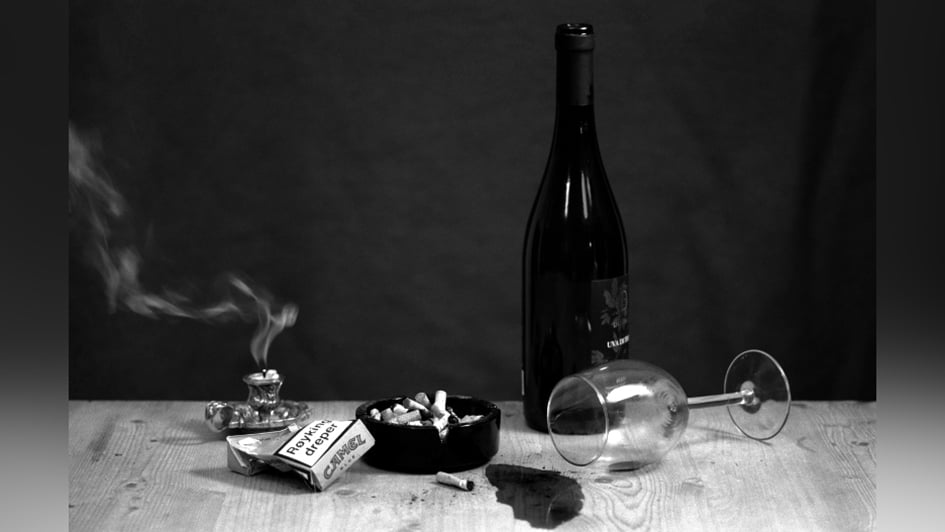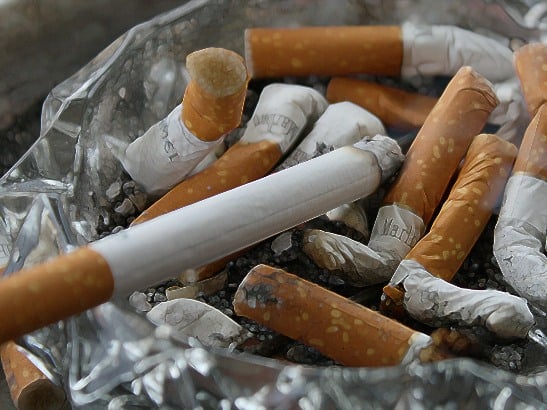
Image: Cigarettes and wine in black and white. Credit: Børge Nordbø via Flickr. License: CC BY 2.0
People have been smoking tobacco recreationally for thousands of years. It’s unlikely many people died as a direct result of the habit since up until the last century few lived to what we would now consider middle-aged, when we might start to see cancer rear its ugly head.
But as we began to live long enough to get cancer, and cigarettes became accessible through mass-production, suspicion about a possible link between smoking and cancer started to arise. It began in the early in the 1900s, and it took decades to gather enough evidence to show a link, and even longer to change behaviour.
Cancer link
The ICR was at the heart of the discovery of the link between smoking and cancer. Professor Sir Ernest Kennaway in the 1920s and 1930s identified the first carcinogens in smoke and coal tar.
World renowned epidemiologist Sir Richard Doll, who went on to become the ICR’s Chairman, found that the risk of developing lung cancer increased in proportion to the amount smoked while he was at the MRC Statistical Research Unit in the 1950s.
Although around 15 per cent of adults in the UK still choose to smoke, survey data suggests that more than 70 per cent of the general public understand the link between smoking and cancer. This awareness has led to the number of people smoking to decrease year on year, and there are a number of social and financial penalties placed on smokers to attempt to bring the numbers down even further.
What about alcohol?
Awareness of the link between alcohol and cancer, however, is not anywhere near as high. A recent survey suggests only 13 per cent of people understand cancer is one of the health risks associated with alcohol consumption.
We don’t yet have the same vast body of evidence for the effects of alcohol compared to smoking, but we do know that alcohol itself can directly cause damage to cells that can trigger cancer, and there is evidence that alcohol consumption increases the risk of seven different types of cancer – that of the mouth, throat, voice box, oesophagus, bowel, liver and breast.
Research at the ICR is underpinned by generous contributions from our supporters. Find out more about how you can contribute to our mission to make the discoveries to defeat cancer.
Moderate drinking
In an attempt to increase public awareness, a new study published in the journal BMC Public Health has estimated the cancer risks associated with moderate alcohol consumption, and drawn a comparison with levels of smoking.
The authors of the research, from University Hospital Southampton NHS Foundation Trust, Bangor University and University of Southampton, found the risk of cancer from drinking one bottle of wine a week was equivalent to smoking 10 cigarettes a week for women and five cigarettes for men.
If non-smoking women and men drank a bottle of wine every week, their lifetime risk of cancer would increase by 1.4 per cent for women, and one percent for men. In real terms, if 1,000 women and 1,000 men each drank one bottle of wine per week, it’s likely that around 14 extra women and 10 extra men would develop cancer at some point in their life.
Heavier alcohol consumption
On the surface, five or 10 cigarettes a week doesn’t sound like a lot. But we need to put that into drinking habits of the nation. The Office for National Statistics reported in their recent 2019 survey that 60 per cent of adults in the UK report they drink up to 14 units a week. That’s quite a lot of people with a moderate increase in risk.
The survey also revealed that 17 per cent of adults – so more than the number of smokers in the UK – reported the drink between 14 and 50 units and 4 per cent reported drinking 50 or more. How do these levels affect risk?
The BMC Public Health study also looked into heavier levels of alcohol consumption and estimated that drinking three bottles of wine per week (around 30 units) could increase lifetime cancer risk by 3.6 per cent in women and 1.9 per cent in men, or 36 in 1,000 women and 19 in 1,000 men. That’s apparently the equivalent to smoking roughly eight cigarettes per week for men and 23 cigarettes per week for women.
“Cancer risk is enormously complex and nuanced”
Dr Minouk Schoemaker is a Staff Scientist and Epidemiologist at the ICR who conducts research into the causes of breast cancer. Commenting on the study, she said:
“The study results offer an interesting insight into the overall lifetime risk of cancer related to alcohol and smoking. They show that drinking even moderate levels of alcohol leads to a relatively greater cancer risk in women than in men, due to the link of alcohol with breast cancer.
“The overall picture of cancer risk is enormously complex and nuanced, so it’s important to keep in mind that this new study is subject to a number of assumptions. For example, it is difficult to disentangle the effects of alcohol and cigarette smoking entirely, and the study did not take into account the duration of smoking or time since stopping.
“There is still limited public awareness of the cancer risks of alcohol, despite the fact that drinking has been linked to common types of cancer and scientists agree that there is no ‘safe’ amount of alcohol in terms of cancer risk. The new research underlines the importance of public health programmes to encourage people to limit their alcohol consumption.”
Changing behaviour
Much like smoking, people have been drinking alcohol for thousands of years. Today, older generations started smoking and drinking before anyone had accepted that it was seriously bad for your health.
So you can understand why there is a reluctance to give up the activities they enjoy, that they may use to escape from the stresses of everyday life. But there is a substantial reduction in smoking, so there may be hope yet for the nation’s alcohol habits.
Communicating cancer risk by putting alcohol consumption in the context of smoking might not be perfect, but it’s a more tangible example that the majority of the general public can understand.
Hope for the future
In October 2018, a study led by researchers at University College London reported that 29 per cent of 16-24 year olds don’t drink alcohol, compared to only 18 per cent in 2005. Those who did drink consumed much less than in 2005 and there was a big reduction in the number of binge drinkers.
Millennials, it seems, have already got the message.
